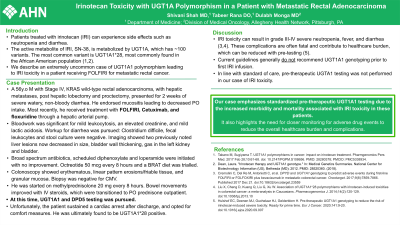Monday Poster Session
Category: Colon
P1730 - Irinotecan Toxicity With UGT1A Polymorphism in a Patient With Metastatic Rectal Adenocarcinoma
Monday, October 23, 2023
10:30 AM - 4:15 PM PT
Location: Exhibit Hall

Has Audio
- TR
Tabeer Rana, DO
Allegheny Health Network
Pittsburgh, PA
Presenting Author(s)
Shivani Shah, MD1, Tabeer Rana, DO2, Dulabh Monga, MD1
1Allegheny General Hospital, Pittsburgh, PA; 2Allegheny Health Network, Pittsburgh, PA
Introduction: Patients treated with irinotecan (IRI) can experience side effects such as neutropenia and diarrhea at varying degrees. The active metabolite of IRI, SN-38, is metabolized by UGT1A, which has ~100 variants. The most common variant is UGT1A1*28, most commonly found in the African American population. We describe an extremely uncommon case of UGT1A1 polymorphism leading to IRI toxicity in a patient receiving FOLFIRI for metastatic rectal cancer.
Case Description/Methods:
A 56 year old male with Stage IV, KRAS wild-type rectal adenocarcinoma, with metastasis to the liver post hepatic lobectomy and proctectomy, presented with a two week history of severe watery, non-bloody diarrhea. He endorsed mucositis leading to decreased oral intake. Most recently he received treatment with FOLFIRI and Cetuximab, with a FUDR hepatic arterial infusion pump.
Bloodwork showed mild leukocytosis, an elevated creatinine, and mild lactic acidosis. Clostridium difficile, fecal leukocytes and stool culture were negative. Imaging showed two previously noted liver lesions now decreased in size, bladder wall thickening, gas in the left kidney and bladder. Broad spectrum antibiotics, scheduled diphenoxylate and loperamide were initiated with no improvement. Octreotide 50 mcg every 8 hours and a BRAT diet was then started. Colonoscopy showed erythematous, linear pattern erosions/friable tissue, and granular mucosa. Biopsy was negative for cytomegalovirus. He was then started on methylprednisolone 20 mg every eight hours. At this time, UGT1A1 and DPD5 testing was pursued. Bowel movements improved with intravenous steroids which were transitioned to oral prednisone outpatient. Unfortunately, the patient sustained a cardiac arrest after discharge, and opted for comfort measures. He was ultimately found to be UGT1A1*28 positive.
Discussion: IRI toxicity can result in grade III-IV severe neutropenia, fever, and diarrhea. These complications are often fatal and contribute to healthcare burden, which can be reduced with pre-testing. However, current guidelines generally do not recommend UGT1A1 genotyping prior to the first IRI infusion.
In line with standard of care, pre-therapeutic UGTA1 testing was not performed in our case of IRI toxicity. Our case emphasizes standardized pre-therapeutic UGT1A1 testing due to the increased morbidity and mortality associated with IRI toxicity in these patients. It also highlights the need for closer monitoring for adverse drug events to reduce the overall healthcare burden and complications.
Disclosures:
Shivani Shah, MD1, Tabeer Rana, DO2, Dulabh Monga, MD1. P1730 - Irinotecan Toxicity With UGT1A Polymorphism in a Patient With Metastatic Rectal Adenocarcinoma, ACG 2023 Annual Scientific Meeting Abstracts. Vancouver, BC, Canada: American College of Gastroenterology.
1Allegheny General Hospital, Pittsburgh, PA; 2Allegheny Health Network, Pittsburgh, PA
Introduction: Patients treated with irinotecan (IRI) can experience side effects such as neutropenia and diarrhea at varying degrees. The active metabolite of IRI, SN-38, is metabolized by UGT1A, which has ~100 variants. The most common variant is UGT1A1*28, most commonly found in the African American population. We describe an extremely uncommon case of UGT1A1 polymorphism leading to IRI toxicity in a patient receiving FOLFIRI for metastatic rectal cancer.
Case Description/Methods:
A 56 year old male with Stage IV, KRAS wild-type rectal adenocarcinoma, with metastasis to the liver post hepatic lobectomy and proctectomy, presented with a two week history of severe watery, non-bloody diarrhea. He endorsed mucositis leading to decreased oral intake. Most recently he received treatment with FOLFIRI and Cetuximab, with a FUDR hepatic arterial infusion pump.
Bloodwork showed mild leukocytosis, an elevated creatinine, and mild lactic acidosis. Clostridium difficile, fecal leukocytes and stool culture were negative. Imaging showed two previously noted liver lesions now decreased in size, bladder wall thickening, gas in the left kidney and bladder. Broad spectrum antibiotics, scheduled diphenoxylate and loperamide were initiated with no improvement. Octreotide 50 mcg every 8 hours and a BRAT diet was then started. Colonoscopy showed erythematous, linear pattern erosions/friable tissue, and granular mucosa. Biopsy was negative for cytomegalovirus. He was then started on methylprednisolone 20 mg every eight hours. At this time, UGT1A1 and DPD5 testing was pursued. Bowel movements improved with intravenous steroids which were transitioned to oral prednisone outpatient. Unfortunately, the patient sustained a cardiac arrest after discharge, and opted for comfort measures. He was ultimately found to be UGT1A1*28 positive.
Discussion: IRI toxicity can result in grade III-IV severe neutropenia, fever, and diarrhea. These complications are often fatal and contribute to healthcare burden, which can be reduced with pre-testing. However, current guidelines generally do not recommend UGT1A1 genotyping prior to the first IRI infusion.
In line with standard of care, pre-therapeutic UGTA1 testing was not performed in our case of IRI toxicity. Our case emphasizes standardized pre-therapeutic UGT1A1 testing due to the increased morbidity and mortality associated with IRI toxicity in these patients. It also highlights the need for closer monitoring for adverse drug events to reduce the overall healthcare burden and complications.
Disclosures:
Shivani Shah indicated no relevant financial relationships.
Tabeer Rana indicated no relevant financial relationships.
Dulabh Monga indicated no relevant financial relationships.
Shivani Shah, MD1, Tabeer Rana, DO2, Dulabh Monga, MD1. P1730 - Irinotecan Toxicity With UGT1A Polymorphism in a Patient With Metastatic Rectal Adenocarcinoma, ACG 2023 Annual Scientific Meeting Abstracts. Vancouver, BC, Canada: American College of Gastroenterology.
